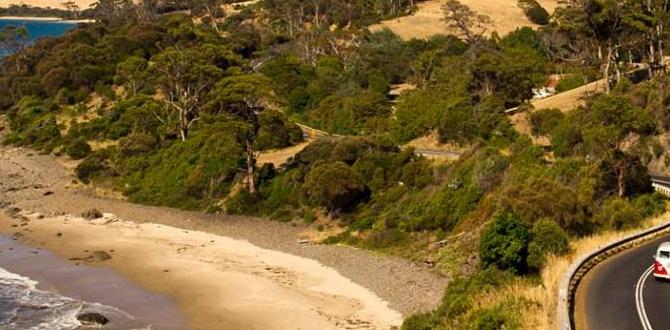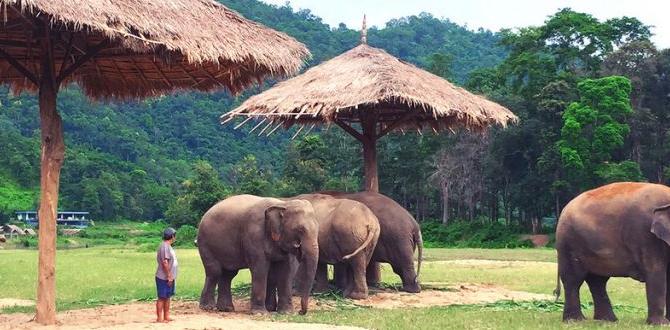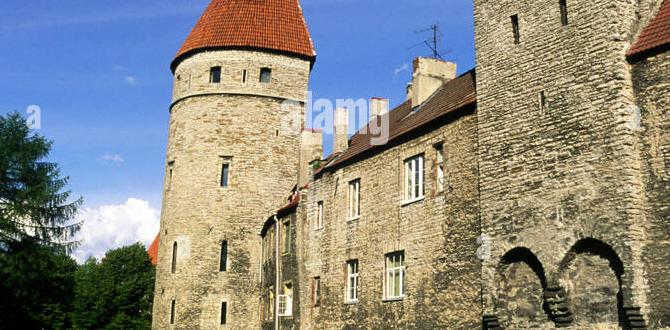Planning an Antigua Guatemala winter trip is easy with this essential guide. Discover the best time to visit, what to pack for comfortable exploration, must-do activities, and delicious food to enjoy. Get ready for a stress-free adventure!
Antigua Guatemala is a gem, especially during winter. Imagine cobblestone streets bathed in warm sunshine, colorful buildings against a backdrop of volcanoes, and a vibrant culture welcoming you. But planning a trip, especially for the first time, can feel a bit overwhelming.
You might wonder about the weather, what clothes to bring, or how to get around. Don’t worry! This guide breaks everything down, making your Antigua winter escape smooth and unforgettable. We’ll cover all the essentials so you can relax and soak in the magic.
Best Time to Visit Antigua Guatemala in Winter
The “winter” months in Guatemala, specifically from November to April, are actually the dry season. This means you can expect plenty of sunshine and pleasant temperatures. It’s the perfect time for outdoor adventures and exploring the colonial city without the unpredictable rains that characterize the wet season.
Weather Patterns and Temperature
During your Antigua Guatemala winter trip, you’ll find the weather to be quite agreeable. Days are typically warm and sunny, rarely getting uncomfortably hot. Temperatures can range from the mid-60s to the low 80s Fahrenheit (around 18-27°C). The real charm of Antigua’s winter is the cool evenings and mornings. Temperatures can drop to the 50s Fahrenheit (around 10-15°C), making cozy sweaters and light jackets a must-have for early mornings and late nights.
Rainfall and Humidity
This dry season is characterized by very little rainfall. You can essentially forget about downpours interrupting your plans. Humidity levels are also lower compared to the wetter months, making it comfortable to walk around and explore the city’s many attractions. This is a significant advantage for any traveler looking for predictable and pleasant weather conditions.
Peak vs. Shoulder Season
While the entire dry season is fantastic, December and January are the busiest months. This is when many people travel to escape colder climates. If you prefer fewer crowds and potentially better deals on accommodations, consider visiting in late January, February, or March. These are shoulder months within the dry season and still offer excellent weather.
Packing Essentials for Your Antigua Guatemala Winter Trip
Packing smart is key to enjoying your travels. For Antigua, think layers and versatile pieces that can be mixed and matched. Comfort is paramount, especially when you’re exploring historical sites and uneven cobblestone streets.
Clothing Recommendations
Lightweight, breathable tops: Cotton t-shirts, linen blouses, or moisture-wicking tops are great for daytime.
Long-sleeved shirts: For sun protection during the day and warmth in the evenings.
Pants or comfortable trousers: Jeans are fine, but consider lighter fabrics like chinos or linen pants for better breathability.
Shorts or skirts: Suitable for warmer afternoons, though many prefer longer options for sun protection and cultural sensitivity.
Sweater or fleece jacket: Essential for cooler mornings and evenings.
Lightweight waterproof jacket or umbrella: While it’s the dry season, a very brief, unexpected shower is not impossible, especially in the highlands.
Comfortable walking shoes: This is non-negotiable! You’ll be doing a lot of walking on cobblestones. Sneakers, sturdy sandals, or hiking boots (if you plan on volcano hikes) are good choices.
Socks: Plenty of comfortable socks for your walking shoes.
Swimsuit: If your hotel has a pool or you plan to visit hot springs.
Footwear and Comfort
Antigua’s charming streets are made of cobblestones, which can be uneven and sometimes slippery. Prioritize footwear that offers good grip and ankle support. Avoid flimsy sandals or high heels. Think about comfort for long days of sightseeing. If you’re a parent traveling with children, ensuring they have comfortable, well-fitting shoes is just as crucial to prevent blisters and meltdowns.
For adults who may need extra support or absorbency for longer days out or unexpected situations, consider travel-friendly personal care items. Products like adult or child diapers can offer peace of mind for those who need bladder protection, ensuring comfort and discretion throughout your explorations. Brands that are discreet and absorbent can make a significant difference in enjoying your trip without worry.
Other Important Items
Sunscreen: The sun is strong at this altitude.
Hat or cap: For sun protection.
Sunglasses: To protect your eyes.
Insect repellent: While not a major issue in the city during the dry season, it’s good to have for evenings or if you venture into more rural areas.
Reusable water bottle: Stay hydrated and reduce plastic waste. Tap water is generally not recommended for drinking; refill stations are common in hotels and cafes.
Small backpack or day bag: For carrying essentials like water, snacks, sunscreen, and a light jacket.
Camera: To capture the stunning scenery.
Portable power bank: To keep your devices charged on the go.
Basic first-aid kit: Including pain relievers, bandages, and any personal medications.
Copies of important documents: Passport, visas, flight details. Keep digital copies as well.
Getting To and Around Antigua Guatemala
Antigua is easily accessible and has a walkable city center, but knowing your transportation options is always helpful.
Transportation from the Airport
The closest major airport is La Aurora International Airport (GUA) in Guatemala City.
Shuttles: This is the most popular and convenient option for tourists. Numerous shuttle companies operate from GUA directly to Antigua. You can book these in advance online or upon arrival at the airport. They are generally safe, comfortable, and cost-effective. Shared shuttles are a great way to meet fellow travelers.
Private Transfers: For more privacy and direct service, private transfers are available. They are more expensive but can be a good option for families or those with a lot of luggage.
Taxis/Ride-Sharing: Taxis are available at the airport, but it’s advisable to use the authorized airport taxis or pre-book a ride to ensure fair pricing. Ride-sharing apps like Uber are also available from the airport into Antigua.
Getting Around Antigua
Walking: Antigua’s historic center is compact and best explored on foot. Wandering through its charming streets is a joy in itself.
Tuk-tuks: These three-wheeled taxis are a fun and affordable way to get around the city for short distances, especially when your feet need a break or you’re carrying shopping. Agree on the price before you get in.
Taxis: Regular taxis are also available for longer rides within or around the city.
Rental Cars: While you can rent a car, it’s generally not recommended for exploring Antigua itself. Parking can be difficult, and the city center is very walkable. If you plan extensive travel throughout Guatemala, then a rental car might be considered, but for just Antigua, it’s likely more trouble than it’s worth.
Top Things to Do in Antigua During Winter
Antigua offers a wealth of activities and sights to enjoy, with the dry winter season providing ideal conditions for exploration.
Explore the Colonial Architecture
Antigua is a UNESCO World Heritage site for a reason. Its well-preserved Spanish colonial architecture is stunning.
Central Park (Parque Central): The heart of the city, perfect for people-watching.
Antigua Cathedral: Admire its facade and history.
Arcade of the Old Palace of the Captains General: Near the cathedral, showcasing historical significance.
Convent and Church of Santa Clara: Beautiful ruins that evoke a sense of history.
San Francisco Church and Convent: A well-preserved complex with a rich past.
La Merced Church: Known for its striking yellow facade and intricate Baroque architecture.
Visit Nearby Volcanoes
The volcanoes surrounding Antigua are a major draw.
Pacaya Volcano: A popular day trip, you can hike to the summit and even roast marshmallows over warm spots. It’s a moderately easy hike and offers incredible views. It’s important to check current eruption status and hiking conditions with local tour operators.
Acatenango Volcano: For the adventurous, an overnight hike up Acatenango to witness the neighboring Fuego volcano erupting is an unforgettable experience. This requires good physical condition and proper gear.
Volcano Tours: Many tour operators in Antigua offer guided tours to these volcanoes, ensuring safety and providing valuable information.
Explore Local Markets and Handicrafts
Antigua boasts vibrant markets where you can find local crafts, textiles, souvenirs, and fresh produce.
Mercado de Artesanías: A fantastic place to shop for handmade goods like textiles, bags, jewelry, and wooden items. Bargaining is common but should be done respectfully.
Local Markets: For a more authentic experience, visit the general markets where locals shop for daily necessities, fruits, vegetables, and more.
Coffee Plantations and Tours
Guatemala is famous for its coffee. Visiting a coffee plantation is a must.
Finca Filadelfia: One of the oldest and largest coffee farms near Antigua, offering tours that explain the coffee-making process from bean to cup, often including samples.
Other Plantations: Many smaller farms also offer tours, providing insights into sustainable farming and the local economy.
Cultural Experiences and Workshops
Immerse yourself in Guatemalan culture.
Spanish Schools: Antigua is a renowned hub for learning Spanish. Even if you don’t enroll in a course, many schools offer cultural activities.
Cooking Classes: Learn to prepare traditional Guatemalan dishes.
Salsa Dancing: Take a salsa lesson and enjoy the vibrant local rhythm.
Chocolate Museums: Learn about the history and process of chocolate making in the region.
Culinary Delights in Antigua Guatemala
Antigua’s food scene is a delightful mix of traditional Guatemalan flavors and international influences.
Must-Try Guatemalan Dishes
Pepian: A rich, savory stew typically made with chicken or beef, and a blend of roasted spices, seeds, and vegetables. Often served with rice.
Kak’ik: A traditional turkey stew seasoned with achiote, cilantro, and various chiles. It’s a flavorful and hearty dish.
Jocón: A green chicken stew made with tomatillos, cilantro, and other herbs.
Tamales: Steamed masa dough filled with meat, vegetables, or fruits, wrapped in banana leaves or corn husks.
Pupusas: Though more associated with El Salvador, they are widely available and enjoyed in Guatemala. These thick corn tortillas are filled with cheese, beans, or chicharrón.
Where to Eat
Local Comedores: Small, family-run eateries offering authentic and affordable Guatemalan meals. Look for places bustling with locals.
Cafés: Antigua has a thriving café culture. Enjoy world-class Guatemalan coffee at places like Caoba Farms (also has a great market and restaurant), Café Condesa, or Three Monkeys Coffee House.
Fine Dining: For a more upscale experience, restaurants like Ambrosía,ahui, or Hector’s Bistro offer excellent food and ambiance.
Street Food: Be adventurous and try street food like elotes (corn on the cob), esquites, or fresh fruit juices (jugos naturales).
Food and Drink Tips
Drink Bottled Water: As mentioned, stick to bottled or purified water to avoid stomach issues.
Try Local Coffee: Guatemalan coffee is renowned. Enjoy it at cafes or buy beans to take home.
Be Adventurous: Don’t be afraid to try new things. The local cuisine is delicious and diverse.
Where to Stay in Antigua
Antigua offers a range of accommodation options to suit every budget and travel style.
Boutique Hotels
Many charming boutique hotels are housed in beautifully restored colonial buildings, offering a unique and romantic experience. These often feature courtyards, gardens, and personalized service.
Hostels
For budget travelers and backpackers, Antigua has numerous hostels offering dorm beds and private rooms. They are a great way to meet other travelers and often organize tours and activities.
Guesthouses and B&Bs
These offer a more intimate and home-like atmosphere, often run by local families, providing a personal touch and local insights.
Luxury Options
For those seeking higher-end amenities, resorts and luxury hotels provide exceptional comfort, fine dining, and beautiful surroundings, often with stunning volcano views.
Safety and Health Tips for Travelers
Antigua is generally a safe city for tourists, but like any travel destination, it’s wise to be prepared and aware.
General Safety Precautions
Be Aware of Your Surroundings: Especially in crowded areas or at night. Keep valuables out of sight.
Avoid Walking Alone at Night: If you need to go out late, take a taxi or tuk-tuk.
Secure Your Belongings: Use hotel safes and be mindful of pickpockets in busy markets.
Be Cautious with Strangers: While most encounters will be friendly, be wary of overly pushy guides or unsolicited offers.
Respect Local Customs: Dress modestly when visiting churches or rural areas. Learn a few basic Spanish phrases.
Health Considerations
Altitude Sickness: Antigua is situated at about 5,000 feet (1,500 meters) above sea level. Take it easy on your first day, stay hydrated, and avoid alcohol to help acclimatize. Symptoms include headache, nausea, and dizziness.
Food and Water Safety: Stick to purified water. Eat at reputable restaurants and places that appear clean and busy. Peel fruits and vegetables or opt for cooked dishes.
Sun Protection: The sun at altitude is intense. Use sunscreen, hats, and sunglasses consistently.
Personal Care Needs: For travelers who require discreet personal care, such as adult or child diapers, preparation is key to a comfortable trip. Many modern products are designed to be highly absorbent, odor-controlling, and virtually undetectable under clothing. Planning ahead by packing an adequate supply or researching where to purchase them locally can alleviate stress and ensure you feel confident and secure throughout your travels, allowing you to focus on enjoying the incredible experiences Antigua offers.
Important Contact Information
Emergency Services: 110 or 120 for police, 123 for ambulance.
Your Embassy or Consulate: Keep their contact details handy.
Budgeting for Your Antigua Guatemala Winter Trip
Antigua Guatemala can be surprisingly affordable, offering options for various budgets.
Accommodation Costs
Hostels: $10-$20 per night (dorm bed)
Mid-Range Hotels/Guesthouses: $40-$100 per night
Luxury Hotels: $150+ per night
Food Expenses
Street Food/Comedores: $3-$7 per meal
Mid-Range Restaurants: $10-$20 per meal
Fine Dining: $25+ per meal
Activities and Transportation
Shuttles (Airport to Antigua): $10-$20
Tuk-tuks: $1-$5 per short ride
Day Tours (Volcanoes, etc.): $30-$100+ depending on the activity and group size.
Entrance Fees to Sites: Generally minimal, often under $5.
Here’s a sample budget breakdown for a 5-day trip for one person, excluding flights:
| Category | Estimated Cost (USD) | Notes |
| Accommodation | $100 – $300 | Based on hostel to mid-range hotel |
| Food | $75 – $150 | Mix of local eateries and





